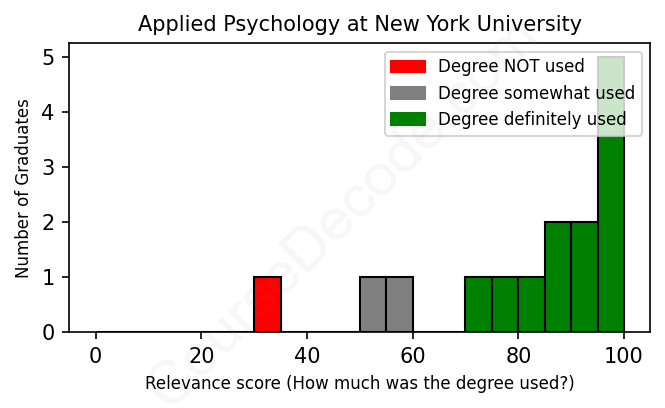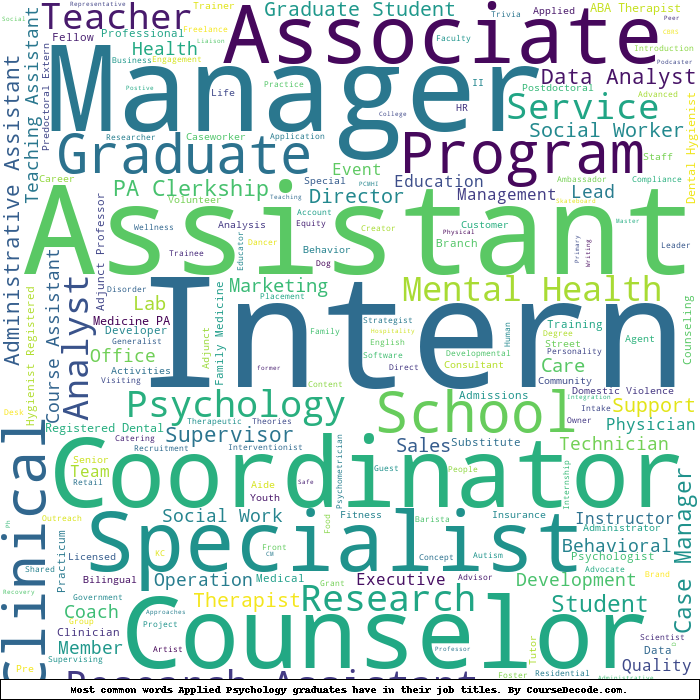
First, some facts. Of the Applied Psychology graduates from New York University we've analyzed , here's how many have used (or NOT used) their degree in their career:

These are estimates based on AI analysis of 15 LinkedIn profiles (see below).
The verdict? Significantly above average. Overall, with an average relevance score of 82%, Applied Psychology graduates from New York University have a much higher likelihood (+15%) of finding work in this field compared to the average graduate across all fields:
And for comparison, here's the chart for all profiles we've looked at across all degrees.
Also, after graduating, 66% of these graduates have pursued further education other than another Bachelor's degree (such as a Masters degree or other), compared to the average across all profiles of 35%. This suggests you may need more than just a Bachelors degree to be competitive as a Applied Psychology graduate.
See the details:
|
Relevance score: 97% We think this person has gone into a career highly relevant to their degree. We think this person has gone into a career highly relevant to their degree.
DEGREE INFOGraduated in 2019 from New York University with a Bachelor of Science - BS in Applied Psychology. No other secondary education since. JOB HISTORY SINCE GRADUATIONIntern NYU Steinhardt School of Culture, Education, and Human Development Mar 2019 - Jun 2019 Assistant Case Manager  ADR Services, Inc. Jul 2019 - Jan 2022 Mental Health Counselor  Progress Foundation Mar 2022 - Present ABOUTNo information provided. |
The top 10 most common jobs done by the graduates we've analyzed (ranked most common to least) are:
After looking through various LinkedIn profiles, it seems that graduates with a degree in Applied Psychology from New York University have pursued a pretty diverse array of careers. A lot of them ended up in roles like clinical social workers, mental health counselors, and data analysts—jobs where understanding human behavior and applying psychological principles is super important. For example, jobs like Licensed Clinical Social Worker at Providence Saint John's Health Center or Associate Psychotherapist at Embodied Mind NYC directly involve helping people using psychological knowledge. There were also quite a few positions centered around research, like Research Assistants at NYU or other relevant institutions, which use skills learned in their degree to analyze data related to human behavior and psychology.
On the flip side, some jobs weren't as relevant to Applied Psychology. Roles like Administrative Assistant or even being a Celtics Dancer don’t really tap into the psychology understanding that graduates have gained during their studies. Overall, though, it seems like most of the jobs do relate back to their degree in some capacity, especially those that are in mental health or research contexts. Many of the graduates have found ways to weave their psychology skills into their daily work, whether they're directly counseling clients or analyzing data related to healthcare outcomes. So, while there are a few outliers, the majority do highlight how versatile a degree in Applied Psychology can be in the job market!
Here is a visual representation of the most common words in job titles for Applied Psychology graduates (this is across all Applied Psychology graduates we've analyzed, not just those who went to New York University):

When you look at the career trajectories of graduates from the Applied Psychology program at New York University, there’s a pretty interesting mix. Right after graduation, many of these folks land roles that are either directly related to psychology or involve some data analysis work that can tie back to their degree. For example, graduates from around 2013 to 2019 often start out as research assistants or in solution-oriented roles like data analysts, interns in mental health settings, or case managers. So, their first jobs show a clear connection to applied psychology, which is a good thing if you’re looking to build a career in that field.
Fast forward five to ten years, and many of these graduates continue to find their niches within the mental health, clinical, or educational sectors. A lot have end up becoming licensed professionals, like clinical social workers or psychotherapists, helping individuals directly. Others gravitate toward roles in research or education, taking on positions as adjunct professors, research coordinators, or even going into program development. While some graduates venture into more tangential fields, like fitness instruction or administrative support, a significant number maintain a strong relevance to their psychology backgrounds. So overall, it seems like a solid path for many, with plenty of opportunities to grow and make a meaningful impact in various settings related to applied psychology.
Honestly, a Bachelor’s degree in Applied Psychology can be a mix of challenging and rewarding, especially at a place like New York University. You’ll definitely dive deep into theory and research, plus have to tackle statistics and experimental design, which can be pretty tough if math isn’t your jam. Balancing all that coursework with group projects and even some hands-on experience can make it feel like a lot sometimes. However, if you're passionate about understanding how people think and behave, it can also be really interesting and fulfilling. Overall, I’d say it’s probably on the harder side of average, but totally doable if you stay organized and engaged!
Most commonly, in the LinkedIn profiles we've looked at, it takes people 4 years to finish a Bachelor degree in Applied Psychology.
Looking at these Applied Psychology grads from NYU, it seems like they're on a pretty mixed financial path. The earlier graduates, like the Data Scientist and the Clinical Social Worker, likely have decent salaries since those roles usually pay well, especially as they gain experience. However, some of the more recent grads have taken on a lot of internships and entry-level positions, like clinical internships and research assistants, which probably don’t pay much. So, overall, while some are probably making good money now, others are just starting out and may not be earning a lot yet. It's a bit of a game of chance when you consider their job choices and career trajectories!
Here is a visual representation of the most common words seen in the "about" section of LinkedIn profiles who have a Bachelor degree in Applied Psychology (this is across all Applied Psychology graduates we've analyzed, not just those who went to New York University). This may or may not be useful:

Here are all colleges offering a Bachelor degree in Applied Psychology (ordered by the average relevance score of their Applied Psychology graduates, best to worst) where we have analyzed at least 10 of their graduates:
| College | Score | Count |
|---|---|---|
 New York University New York University
|
82 | 15 |
 University of Illinois at Chicago University of Illinois at Chicago
|
75 | 13 |